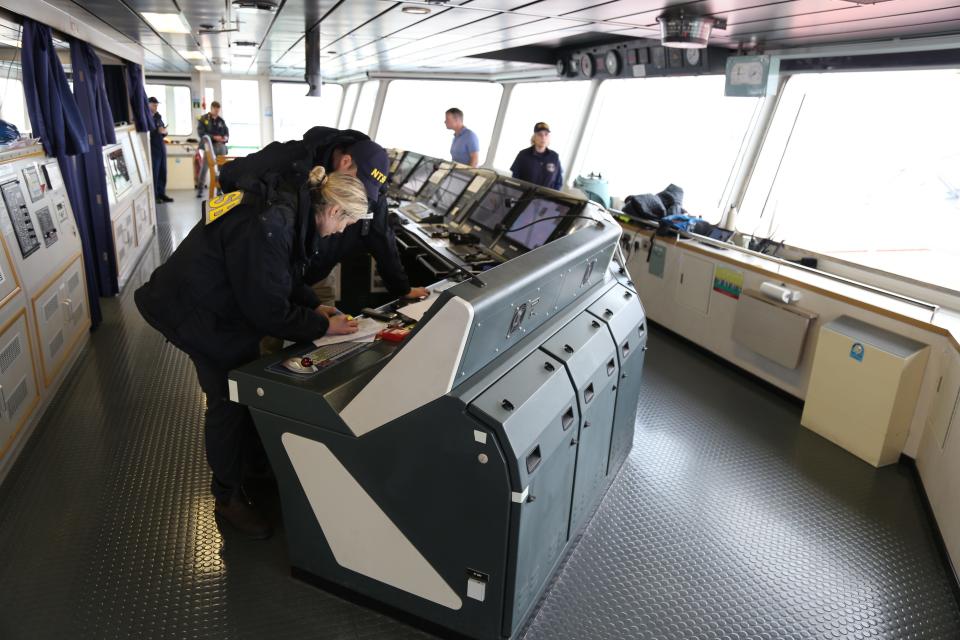Dali crew still confined to ship − with no internet. They could be 'profoundly rattled.'
As authorities in Baltimore turned to salvaging the wreckage of the Francis Scott Key Bridge after it collapsed into the Patapsco River, the Rev. Joshua Messick had his attention Thursday on the crew of the Dali, the ship that struck the span.
The 22-member crew of the Dali, made up of Indian nationals, has remained on board since the Tuesday incident, Coast Guard spokesperson Cynthia Oldham told USA TODAY. They were not injured and are monitoring engineering spaces and will "appropriately respond to any emergency on board," Oldham said.
Messick, executive director of the Baltimore International Seafarers' Center, hasn't yet had any direct contact with Dali crew. But he believes they are likely "profoundly rattled, unsure about their futures, probably worried, and since they don’t have internet they don’t know what the rest of the world is saying about them."
Crew members may be fearful that they're being blamed for a situation beyond their control, too, he said.
The latest: Baltimore bridge rescues called off; insurers face billions in losses
Seafarers' group also reaching out to other ships in the port
Messick said the nonprofit is working with the Coast Guard, U.S. Customs and Border Patrol and International Transport Workers Federation; they expect to get access to the ship Friday or early next week.
The ship was headed for Sri Lanka from the Baltimore port when it crashed, a journey that would have taken about four weeks, meaning the crew was stocked with enough supplies to last them that long.
Messick and the center's volunteers will offer pastoral care and emotional support to the crew as well as more practical assistance.
"They do not have reliable internet," said Messick, an Episcopal priest. "So we will take hotspots and SIM cards so they can connect with their families."
Seven other ships are also stuck in the port, with about 150-200 people total onboard, Messick said. He and volunteers have visited each of those ships, taking those who can and want to go ashore into Baltimore on the center's four passenger vans.

Who are the crew members aboard cargo ships like the Dali?
Messick, who's been with the 30-year-old nonprofit for two years, said language is not a barrier, as crew members aboard ships like the Dali speak English.
"English is the language of the sea," he said.
Crew members can only come ashore if they have a U.S. visa and a shore pass; they also have to be accompanied by an escort from the center. Usually, they'll go to a mall or Walmart, looking for provisions for themselves and their crewmates, gifts to send home to their families and video games and other diversions to keep them occupied during their downtime.
They're often young and at the start of careers that will take them around the world and away from home for as long as 13 months at a time. They're paid well compared to wages in their home countries but don't make much by U.S. standards, and most of their money goes to support families at home.
The salvage effort: How do you move a massive ship and broken bridge? It could keep Baltimore port closed for weeks
Why is the crew confined to the ship?
It makes sense that the crew will stay put for now, said Stephen Frailey, a partner with the West Coast-based Pacific Maritime Group that helps with marine salvage and wreck removal. The crew members are a key part of the investigation into what went wrong and the process of ultimately moving the ship from the wreck site because they know the ship's systems best, Frailey said.
If staying on board became a safety risk to the crew, Frailey said they would likely be evacuated and housed nearby so they can continue to work with investigators.
“It’s their ship, they have a responsibility to it,” he said.
"Seafarers work in dangerous and lonely situations at the best of times," Messick said. "That was compounded in this case. They are often first to be blamed when something goes wrong − with pandemic they were vilified for a time because they were viewed as disease-carrying people who brought COVID into our ports.
"But they were the ones who kept our world going. We as society didn’t respect them enough for that."
This article originally appeared on USA TODAY: Dali crew still confined to ship near Baltimore bridge collapse

